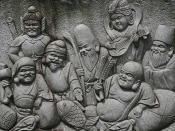this is a research essay. it is factual and it includes personal views of the writter. It is precise and to the point.
Cloning: Why we shouldn't be against it
You have been told that you are unique. The belief that there is no one else like you in the whole world made you feel special and proud. This belief may not be true in the future.
The world was stunned by the news in late February 1997 that a British embryologist named Ian Wilmut and his research team had successfully cloned a lamb named Dolly from an adult sheep. Dolly was created by replacing the DNA of one sheep's egg with the DNA of another sheep's udder. While plants and lower forms of animal life have been successfully cloned for many years now, before Wilmut's announcement it had been thought by many to be unlikely that such a procedure could be performed on higher mammals.
The world media was immediately filled with heated discussions about the ethical implications of cloning.
Some of the most powerful people in the world have felt compelled to act against this threat. President Clinton swiftly imposed a ban on federal funding for human-cloning research. Bills are in the works in both houses of Congress to outlaw human cloning which it taken to be a fundamentally evil thing that must be stopped. But what is exactly bad about it? From an ethical point of view , it is difficult to see exactly what is wrong with cloning human beings. The people who are afraid of cloning tend to think that someone will break into Napoleon's Tomb, steal some DNA and make 2000 emperors. In reality, cloning would be probably used by infertile people who now use donated sperm, eggs, or embryos. Do the potential harms...


